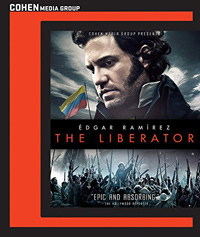 Selected as the Venezuelan submission for Best Foreign Language Film for the 2014 Academy Awards, Alberto Arvelo’s The Liberator, a biopic on Simon Bolivar, actually made the shortlist of the final nine films. The positive attention it received from Academy members did little for its box office potential, grossing only $113,000 in the US. While many seemed to agree on the film’s faults, it wasn’t without its champions, particularly concerning Edgar Ramirez’s noble performance as Bolivar.
Selected as the Venezuelan submission for Best Foreign Language Film for the 2014 Academy Awards, Alberto Arvelo’s The Liberator, a biopic on Simon Bolivar, actually made the shortlist of the final nine films. The positive attention it received from Academy members did little for its box office potential, grossing only $113,000 in the US. While many seemed to agree on the film’s faults, it wasn’t without its champions, particularly concerning Edgar Ramirez’s noble performance as Bolivar.
Arriving with all the earmarks of a truncated and incredibly abridged version of history in order to cram into the corset of a two hour cinematic straightjacket, this unwisely attempts to chart nearly the entire life of Simon Bolivar in one dense chunk. The result is a jack hammered miasma of assorted clichés, conflating events into a romanticized exaggeration of generalization, which collapses, as these types often do, into a hellishly dull exercise more appropriate for a high school history course.
It is September 25, 1828 in Bogota and Simon Bolivar (Ramirez) has just been chased out of the bed chamber of his lady love to evade members of the Spanish monarchy. We fly back to twenty eight years earlier in time, to his period as a wealthy member of the Venezuelan elite, visiting Spain to battle Prince Ferdinand in tennis and steal the heart of future wife Maria Theresa (Maria Valverde). Her eventual death throws him into a crisis of distraction, but ultimately is the inspiration for his passion to become the military and political leader of Venezuela in order to rescue his country from the Spanish Empire. Many political maneuverings ensue right up to his death of tuberculosis, but the film explores the possibility of the many conspiracy theories that surround his death, namely assassination.
Despite its various shortcomings, The Liberator is impeccably filmed, sporting a production value worthy of something far greater. Xavi Gimenez, responsible for the distinctive beauty of Anderson’s The Machinist, Amenabar’s Agora, and Cortes’ Red Lights, captures a splendorous Venezuela. But it’s an empty, ultimately cold beauty, and one wishes the camera would just zoom off into one of its many landscape panoramas. Battle scenes are healthily, swarthily rendered, but they’re plopped down without tension or recourse, simply an action break between long bouts of politically inspired banter.
It’s surprising to note the script was penned by Timothy J. Sexton, who wrote Children of Men (2006) and the much more inspiringly rendered Cesar Chavez (2014). Perhaps it’s the period, the 1820s so far in the past that the tendency seems to be to relay the time and place as watered down romanticism, like the historical epics of the Hollywood studio era.
As Bolivar, Edgar Ramirez seems rather vacuous here, a pity considering his representation of a more modern revolutionary in Olivier Assayas’ Carlos (2010). The beret is replaced with a mane that rivals Samson’s, but his venerable brow beating of heroic ideologies always feel like nicely written, overly mannered speechifying. The film rather repetitively establishes Bolivar’s insistence on overcoming the critique that he was simply a spoiled rich boy, but does little to establish distance from that actuality.
Laughably pointed exchanges transpire in between bouts of convenient time collapse. Schooled in the rhetoric of academics, Bolivar is told they’re living the age old predicament of “oppressors against the oppressed—you’ve got to decide which side you’re on.” Later, Bolivar deduces that “the wish to be free is a natural impulse.” A smarmy Danny Huston shows up as Torkington, funneling English money into Bolivar’s revolution, but strings are, of course, attached.
The Liberator is a nicely framed, highly romanticized, and undeniably dry portrait of a revolutionary. It’s not that Bolivar’s legacy isn’t without cinematic worthiness—but there has yet to be a memorable film treatment. To his credit, Ramirez’s face heartily eclipses that of Maximillian Schell’s little seen 1969 performance.
Disc Review:
Cohen Media Group presents Arvelo’s title as a regal historical epic. Splashed with a multitude of high profile raves, the Blu-ray package arrives with a 2.35:1 aspect ratio. The film’s strengths lie in its visual prowess, and it’s a handsome transfer. Cohen also added a couple extra features including an introduction and a featurette.
Introduction by Gustavo Dudamel:
A one minute intro from composer Dudamel, who describes Bolivar as the Venezuelan equivalent of George Washington.
Making-of Featurette:
A forty minute behind the scene features finds extras and other crew members sounding off on their inspirations concerning Simon Bolivar. Extensive research went into constructing a comprehensive portrait of Bolivar’s life, with the casting of Ramirez seen as a major asset to the production.
Final Thoughts:
The Liberator is a nicely framed, highly romanticized, and undeniably dry portrait of a revolutionary. It’s not that Bolivar’s legacy isn’t without cinematic worthiness—but there has yet to be a memorable film treatment. To his credit, Ramirez’s face heartily eclipses that of Maximillian Schell’s little seen 1969 performance.
Film: ★★/☆☆☆☆☆
Disc: ★★★/☆☆☆☆☆


